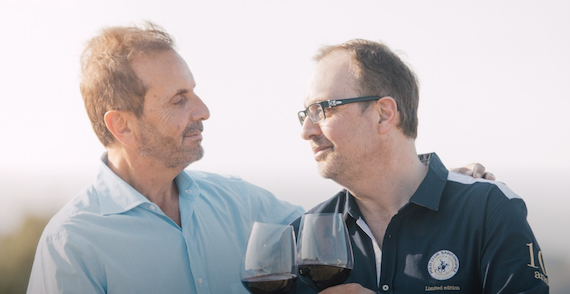It has already gained listings in 35 countries and its top wines are gaining traction at high-end merchants like Hedonism Wines in London. However, Paso Robles is not exactly renowned as a fine wine hotspot, and winemaker Daniel Daou is keen to dispel some negative stereotypes about the region.
“There are myths that I would love to debunk about Paso Robles being too hot,” says Daou. “We hear that all the time. Paso is 614,000 acres, so it’s larger than Napa and Sonoma put together. It’s virtually impossible to say that Paso is too hot or too cold, because you could be six miles to the Pacific Ocean and it’s too cold to grow grapes, because the average temperature is 52F all year, or you could be 35 miles inland from the Pacific Ocean and it is hotter than hell and it won’t grow anything.
“We are located in the Adelaida District, which is the only mountainous range in Paso. The average altitude is anywhere from 1,700ft to 2,200ft, and that area is known for having calclaire clay, which happened due to tectonic movements millions of years ago. Because of the high elevation, we tend to have perfect weather to ripen Carbenet Sauvignon throughout the year.
“It’s important to monitor 100 degrees weather. At 100F, you can have sunburn, the vine stops producing sugar, and the quality of the wine is impacted. Last year, downtown Paso saw 27 days at 100 degrees. Napa saw 11 days at 100 degrees. Calistoga in Napa saw close to 20. Even Bordeaux last year saw four days at 100 degrees.
“They had a horrible heatwave last year. It was devastating. Our mountain saw zero days at 100 degrees. Our average temperature was about 82 degrees, which is perfect for ripening Cabernet.”
Daou and his brother Georges were born in Lebanon. When the civil war erupted, they moved to Paris with their parents, as their mother is French. They grew up in Paris and Cannes, and that sparked their love of wine.
Georges moved to the United States when he was 18 years old, and Daniel followed four years later when he too became an adult. They went to college, became engineers, and founded a hi-tech company providing network integration for the healthcare industry.
However, they always hankered for the sort of agricultural lifestyle enjoyed by their grandparents, who owned an olive farm in Lebanon. The company performed very well, so they cashed out.
“When I was 40 years old – 14 years ago – I did something crazy,” says Daou. “I abandoned my entire life down in southern California, bought a mountain with my brother, moved up here, erected a small trailer of about 1,000 sq. ft., and planted the first 22 acres myself.
“There wasn’t any doubt in my mind that I wanted to be a winemaker. The goal was to live as farmers and winemakers. Georges is not a winemaker – I take that role in the company, and he is more in sales and marketing – but he loves the way of life that we have created here in Paso Robles.”

They chose Paso Robles due to its unique terroir. “We have a very strong belief that we had encountered one of the world’s greatest terroirs for growing Cabernet Sauvignon and Bordeaux varieties,” says Daou. “Most of the great vineyards in Europe are grown on calcaire clay. That soil has a layer of clay, and it is going to give you bouquet, flesh in the wine, great aromatics and great colour. The calcairous part of that soil is important, because it allows you to have unadulterated wines, and they allow you to dry farm.
“In France it rains all summer, so it’s easy for them, but in California we don’t see rain from April to November, so the ability to dry farm is very important if you the soils that allow you to do that. California typically does not have these soils. Places like Napa and Sonoma don’t have this European soil.
“They have clay, low, volcanic, sandy soil, which are not really known in France or Europe to be used for winemaking. It provides rich fruit, but lacks on the minerality and natural acidity.
“We like to say that this is the most French terroir in California, with soil similar to Bordeaux. Nowhere else on this planet have we been able to find a place that has the great climate of Napa and the great soils of Bordeaux.”
The brothers released their first estate wine seven years ago, and Daou Vineyards now bills itself as the fastest growing winery in America, with listings in all 50 states. It produces everything from a basic Cabernet up to the iconic Soul of a Lion, widely considered to be one of the world’s finest wines.
“Today are the fastest growing winery in the United States,” says Daou. “That’s purely based on the quality of the wine. We would love to think of ourselves as greater marketeers, but in reality until my daughter got involved in marketing and we hired [PR firm] Pray Tell, we had never done any marketing.
“People will buy your wine, but if you have a great wine they will buy it again and again a thousand times. That has contributed to the great success of our winery in the United.
“We have received great ratings for our wines. We are the only winery in California, outside of Napa, that has received many, many 98 to 100-point ratings for our Cabernet. The last Wine Advocate review had 526 wines reviewed, and we were the only winery that had a 98-point, and we actually got five 98-pluses, one 98 and one 97-100.”
The plan now is to target growth in export markets to highlight the potential of Paso Robles. Global drinks buyers and consumers in export markets can benefit from a strong price to quality ratio, as Paso Robles is not as famous as regions like Napa and Sonoma.
“Earning respect worldwide is very important for us. We are telling the story on a global basis,” says Daou. “We love our wines, and we want the world to discover us, not just the United States.
“We offer approachable luxury. All of our wines over-deliver on the price. That has contributed to our success. In America, we sell our Soul of a Lion for about $125. You can’t get anything else of that quality in the world at that price. Even our $20 Cabernet over-delivers. Our philosophy is make great wines and over-deliver on the price so that consumers are able to get a lot more for their money.”
Daou also brushes off fears that climate change poses a threat to the perfect terroir he has discovered in Paso Robles. “We are seeing more extremes,” he says. “We are seeing and hotter heatwaves. We are also seeing longer cooling trends. In 2017, we had a very ugly heatwave that affected the entire west coast of America. We lost some production, but right after heatwave, the weather cooled right down, like 60 or 70 degrees and stayed cool, and the wines turned out amazing.
“Average temperature has remained the same. The hotter heatwaves are being compensated by the cooling trend. We have taken a lot of steps in the vineyard to alleviate the pressure of the heatwaves too.”




